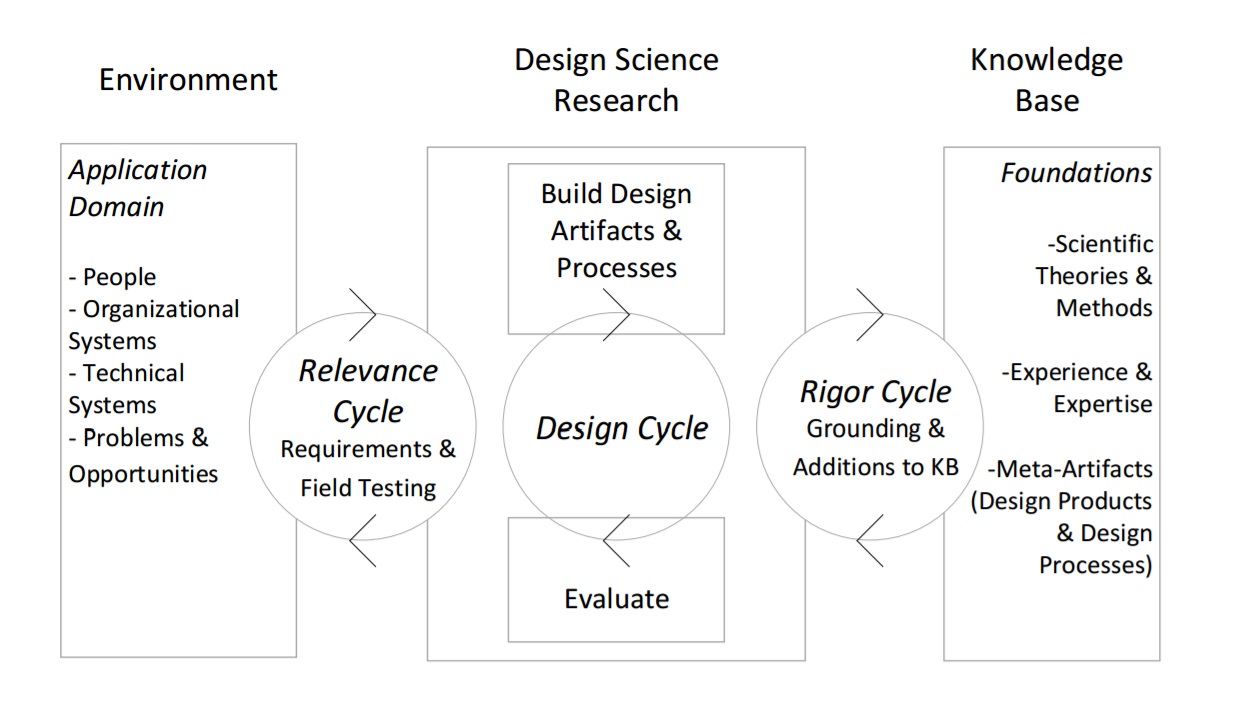Increasing Beneficial Interactions in a Computer-Supported Collaborative Environment
11 Dec 2016 · 3 min read Figure: A Three Cycle view of Design Science Research Process (Hevner, 2007)
Figure: A Three Cycle view of Design Science Research Process (Hevner, 2007)
My recently defended doctoral thesis on computer-supported collaborative work is now available online. The application domain in university level engineering education, and gamification is one of the major methods I investigated and applied. The thesis also includes a rather thorough use of the design science methodology in design, implementation cycles and validation.
Read More
Find the PDF available for free from the Doria library archive.
Reference
Knutas, A. (2016). Increasing Beneficial Interactions in a Computer-Supported Collaborative Environment. Acta Universitatis Lappeenrantaensis.
Publications included in the thesis
- Knutas, A., Ikonen, J., & Porras, J. (2013). Communication patterns in collaborative software engineering courses: a case for computer-supported collaboration. In Proceedings of the 13th Koli Calling International Conference on Computing Education Research (pp. 169-177). ACM. Preprint from ResearchGate.
- Knutas, A., Ikonen, J., & Porras, J. (2015). COMPUTER-SUPPORTED COLLABORATIVE LEARNING IN SOFTWARE ENGINEERING EDUCATION: A SYSTEMATIC MAPPING STUDY. International Journal on Information Technologies & Security, 7(4). IJITS Archive. Preprint from ResearchGate.
- Ikonen, J., Knutas, A., Wu, Y., & Agudo, I. (2015, November). Is the world ready or do we need more tools for programming related teamwork?. In Proceedings of the 15th Koli Calling Conference on Computing Education Research (pp. 33-39). ACM. Preprint from ResearchGate.
- Knutas, A., Ikonen, J., Nikula, U., & Porras, J. (2014, June). Increasing collaborative communications in a programming course with gamification: a case study. In Proceedings of the 15th International Conference on Computer Systems and Technologies (pp. 370-377). ACM. Preprint from ResearchGate.
- Knutas, A., Ikonen, J., Maggiorini, D., Ripamonti, L., & Porras, J. (2016). Creating Student Interaction Profiles for Adaptive Collaboration Gamification Design. International Journal of Human Capital and Information Technology Professionals (IJHCITP), 7(3), 47-62. DOI: 10.4018/IJHCITP.2016070104. IGI Global.
Abstract
University and software engineering teaching are changing in response to the industry demand for new skills. Learning is becoming more interactive, and the impact of student collaborative learning has increased. The extension of collaboration with computer-supported collaborative environments allows increased knowledge building between a wider range of participants. More flexible teaching structures independent of place or time, better monitoring of student understanding by instructors, and improved student productivity and satisfaction can also be facilitated. However, the collaboration has to be implemented carefully, or it will become a drawback instead of a benefit. The first objective of this study is to document the current state of the utilization of collaborative environments and methods in software engineering education. The next stage is to use the results to first specify the requirements for a computer-supported collaborative environment, then to design and implement a prototype, and finally to use this prototype to evaluate and validate the design for improved collaboration. The research follows the design science research process, where a solution design is created through an iterative design and evaluation process and the solution is validated through its utility. A design for improving collaboration by improving issue-related and inter-team communication is created. The collaboration is promoted further by applying gamification to the design. The study shows that engineering students can be encouraged to collaborate online with the application of gamification, that the system increases connectivity in collaboration patterns, and in some cases this collaboration has positive results for learning goals. During the research, the state of gamification design for computer-supported collaboration was developed further by connecting it with the theory of player profiles. Different types of players respond best to different kinds of rewards, for example a simulated social status or additional challenges instead of just an increased score. This study also presents a method for creating gamification profiles from empirical observations in collaborative learning environments.